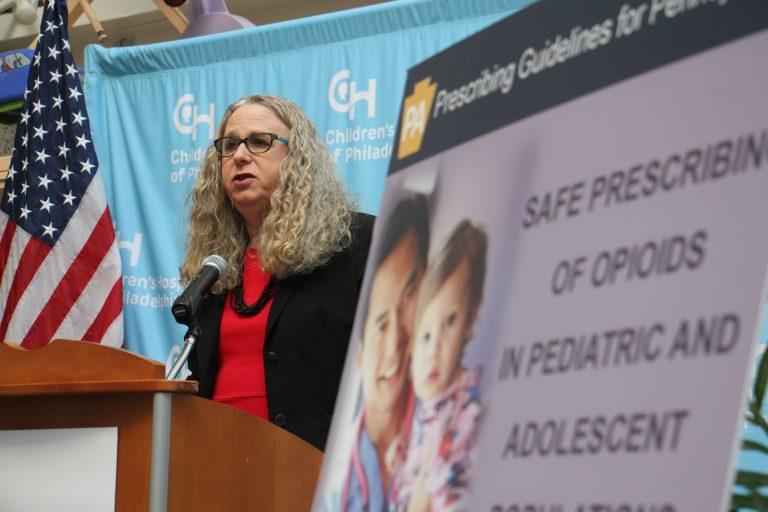http://wesa.fm/post/pa-sets-new-guidelines-prescribing-opioids-kids#stream/0
By JOEL WOLFRAM
Pennsylvania’s top health official visited the Children’s Hospital of Philadelphia Friday to introduce new guidelines for prescribing painkillers to kids. It’s one of the state’s most recent efforts to address the growing opioid epidemic.
The guidelines are the latest in a series the state has adopted to advise doctors in different medical specialties and suggest that, in children and adolescents, opioids should only be given in cases of moderate to severe pain. When they are prescribed, they should be at the lowest effective dose; short-acting opioids should be used first; and doctors should only supply as many pills as needed to get a patient through the duration of their symptoms, according to the state’s advice.
Pennsylvania’s acting Health Secretary and Physician General, Dr. Rachel Levine, said this is part of a larger effort to combat the state’s epidemic and promote what she called “opioid stewardship.”
“Opioids, although necessary medicines, have to be used by health care professionals much more carefully, and more judiciously,” Levine said. “That is the change in the medical paradigm that’s occurring now.”
The guidelines were written by a task force that included state agencies, medical associations, members of the public, and physicians at places such as CHOP.
“What came out of this collaboration are a set of common-sense procedures that will address this current crisis, and protect future generations of children,” said CHOP’s chief operating officer, Doug Hock.
The recommendations leave room for a physician’s judgment in tailoring the right care regimen to fit patients’ unique needs, said F. Wickham Kraemer, director of the Acute and Chronic Pain Management Program at CHOP.
Kraemer, one of the authors of the new prescribing manual, emphasized that opioids should only be provided in “as small a dose as possible for as short a time as possible.” That would help patients avoid becoming dependent on the drugs, he said.
“The more medication you take, the more likely your body is going to need it for a period of time,” Kraemer said.
Ways to manage pain without using opioids or other medications — including psychotherapy — are also discussed in the new guidelines. Kraemer said CHOP’s chronic pain clinic has a staff psychologist who evaluates every patient to address the emotional aspect of pain.
“Many of these patients come back for therapy and do not need to see me for any medications at all,” Kraemer said.
According to the state’s recommendations, forms of psychotherapy, including cognitive-behavioral therapy, have proved effective in relieving pain.
“The mind-body connection has a huge role in the perception of pain,” Kraemer said.
Comment;
I cannot help but wonder how important this really is! How many children are on long-term opioids? I cannot recall ever caring for such a child in my career as a family physician that began in 1986. Is this just one more to jump on the popular bandwagon in an attempt to get funding?
- COVID UPDATE: What is the truth? - 2022-11-08
- Pathologist Speaks Out About COVID Jab Effects - 2022-07-04
- A Massive Spike in Disability is Most Likely Due to a Wave of Vaccine Injuries - 2022-06-30


